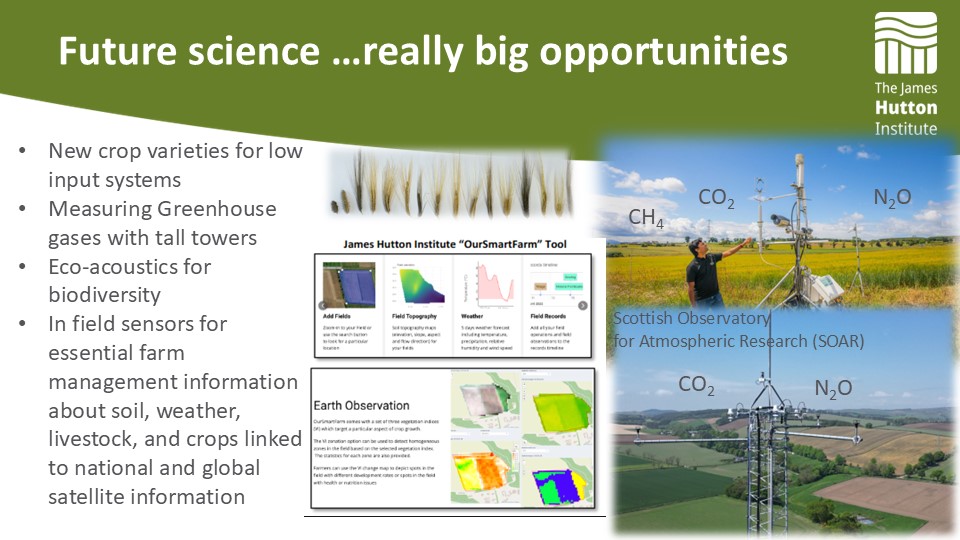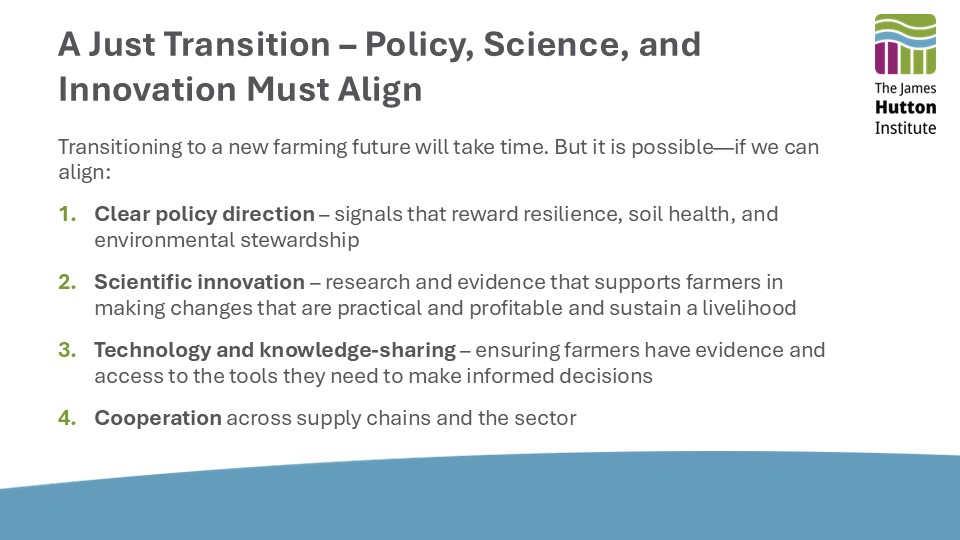How can farming adapt in the face of rapid change?
Professor Colin Campbell, Chief Executive at The James Hutton Institute, spoke about the importance of soil health at NFU Scotland‘s National Conference on Thursday 6th February 2025.
NFUS Annual Conference Speech – Professor Colin Campbell:
It’s an honour to be here today to discuss one of the most pressing questions for our industry: how can farming adapt in the face of rapid change?
Let me begin with the story of James Hutton. A farmer, a geologist, and a visionary, Hutton fundamentally changed the way we understand the land beneath our feet. His insights into soil formation and landscape evolution underpin the very principles of sustainable agriculture today. Hutton understood that farming is not static—it must evolve, guided by science, innovation, and a deep respect for the natural world.
And evolve it has. If we look back over the past 80 years, the changes in agriculture have been profound. Since the Second World War, farming has transformed—mechanisation, synthetic fertilisers, and high-yield crops have driven production efficiency to feed a growing population. But now, the challenges we face require us to think beyond yield alone.
We live in an era of immense global change. By 2050, the world’s population will reach nearly 10 billion, demanding more food, water, and energy than ever before. Climate change adds another layer of complexity, intensifying extreme weather events—floods, droughts, heatwaves—testing the resilience of our agricultural systems.
However, Scotland finds itself in a relatively fortunate position. Unlike many parts of the world facing severe drought and desertification, we have a temperate climate, rich soils, an abundance of freshwater, and renewable energy potential. With careful management, these natural assets could allow Scotland to not just weather the storm of change, but thrive in it.
That said, adaptation will not be easy. Our weather will become increasingly variable, making it essential for farming systems to be resilient—not just to sudden shocks, but to long-term shifts in climate patterns.
“However, Scotland finds itself in a relatively fortunate position. Unlike many parts of the world facing severe drought and desertification, we have a temperate climate, rich soils, an abundance of freshwater, and renewable energy potential. With careful management, these natural assets could allow Scotland to not just weather the storm of change, but thrive in it”
Prof. Colin Campbell, The James Hutton Institute

So how do we make our farms more resilient? One of the most effective strategies is to focus on soil health.
By increasing soil organic matter, we can retain more moisture, making farms better equipped to handle both extreme rainfall and periods of drought, providing nutrients to not just crops but to the natural food web of the soil and vegetation growing in it.
Regenerative agriculture, agroecological practices, and holistic land management offer pathways to achieving this. These approaches prioritise:
- Building soil organic matter, enhancing fertility and water retention
- Reducing reliance on chemical inputs, lowering costs and environmental impact
- Enhancing biodiversity, creating more resilient ecosystems
This isn’t just theory—it’s happening now. Across Scotland, farmers are already transitioning to systems that improve soil health and reduce input costs. The key message is that while this transformation takes time, significant benefits can be realised—sometimes in just a few years.
Farming for More Than Just Food
The post-war era focused on maximising food production as cheaply as possible. Today, the goal has evolved: we must farm not just for food, but for food, nature, and the climate.
Scotland’s changing climate presents new opportunities. Our research at the James Hutton Institute shows that land capability for agriculture is improving, allowing for a wider range of crops to be grown here. At the same the south-east of Britain will find it harder to grow the current range of staple crops and such cropping may need to move further north. We are already seeing farmers successfully growing fodder maize, and some are experimenting with soya, hemp, and other legumes—crops that, with the right science and breeding, could become viable at scale.
Science and innovation will be key to this transition. We need climate-resilient crop varieties, adapted to low-input systems. Additionally advances in agritech—such as sensor-informed smart farming tools—will help farmers manage land more precisely, measuring not just yields, but the multiple benefits their management decisions provide.
A Just Transition – Policy, Science, and Innovation Must Align
Transitioning to a new farming future will take time. But it is possible—if three things align:
- Clear policy direction – signals that reward resilience, soil health, and environmental stewardship
- Scientific innovation – research that supports farmers in making changes that are practical and profitable
- Technology and knowledge-sharing – ensuring farmers have access to the tools they need to make informed decisions
At the James Hutton Institute, we are actively developing solutions. Take HydroGlen, our living laboratory for integrating hydrogen and renewable energy into farm systems. We are doing a real time experiment of how we can use renewable wind and solar to generate green hydrogen on the farm for power, heat and fuel for agricultural machinery. This could reduce greenhouse gas emissions on the farm by 10% by replacing fossil fuels; make it resilient in the face of storms that interrupt supplies and independent of global energy prices. Advances in sensor technology coupled with satellite and remote sensing are helping to develop near real-time sensor-informed smart farm tools, helping farmers measure and optimise their land use for multiple benefits so they can prove to suppliers and consumers they are doing things right. These are just some examples of how science can support a more adaptable, climate-ready agriculture sector.
Scotland is well placed to lead the way in adapting to change. We have the land, the water, soils and natural assets as well as the knowledge, and the commitment of farmers who have always been at the forefront of innovation.
Yes, the challenges are real. But so too are the opportunities. If we invest in our soils, embrace regenerative systems, and harness the power of science and technology, we can build a resilient, productive, and sustainable future for Scottish farming—one that not only feeds us but sustains our landscapes, communities, and climate for generations to come.


